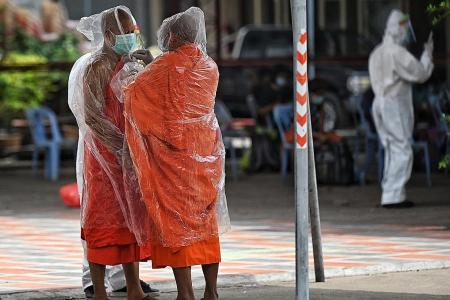Thailand makes masks mandatory, bans restaurant dining in Bangkok
BANGKOK: Thailand added more measures yesterday to arrest its biggest coronavirus outbreak yet, including a nationwide requirement to wear masks in public and a ban on dining at restaurants in and around its capital.
The authorities have reclassified Bangkok and five provinces as highest-controlled zones.
There are 46 others with broad restrictions after a third Covid-19 wave that has seen more than half of the country's overall infections this month alone.
Masks are widely worn in Thailand but the order to make them mandatory comes just a few days after Prime Minister Prayut Chan-o-cha was fined 6,000 baht (S$255) for failing to wear one during a meeting.
Parks, gyms, cinemas, bars, restaurants, daycare centres and schools have been closed in Bangkok, the outbreak epicentre, and non-essential travel from the capital is discouraged.
Public transport is still operating, and malls remain open but for shortened trading hours.
"This is not a lockdown, not a curfew, but we are asking for your cooperation," coronavirus task force spokesman Taweesin Wisanuyothin told a briefing.
A total of 34,707 cases and 94 deaths have been reported this month alone, bringing total infections to 63,570, with 188 fatalities. There were 1,871 new cases and 10 deaths reported yesterday.
IMMUNISATION PENDING
The outbreak includes the highly transmissible B117 variant blamed for driving the contagion in many countries.
Thailand has yet to start its mass immunisation drive but has stepped up efforts to secure supplies to add to the 2.5 million doses it has received from Sinovac Biotech and 61 million shots of AstraZeneca's vaccine to be produced locally.
The government is looking to Sinopharm, Moderna, India's Bharat Biotech and Johnson and Johnson as added sources, Mr Taweesin added, with the aim of inoculating 70 per cent of the population. - REUTERS
Get The New Paper on your phone with the free TNP app. Download from the Apple App Store or Google Play Store now



